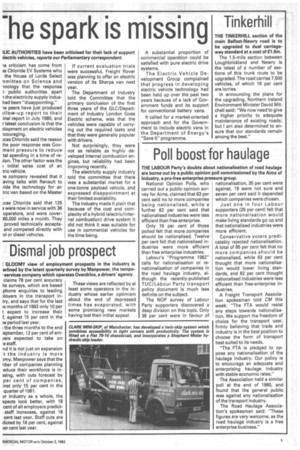he spark is missing
Page 5

If you've noticed an error in this article please click here to report it so we can fix it.
ILIC AUTHORITIES have been criticised for their lack of support dectric vehicles, reports our Parliamentary correspondent.
le criticism has come from 5s Chloride EV Systems who the House of Lords Select nmittee on Science and inology that the response 1 public authorities apart ithe electricity supply Indushad been "disappointing." le peers have just produced rIlow-up report to their inal report in July 1980, and r latest conclusion is that the slopment on electric vehicles icouraging.
ices Chloride said the reason he poor response was Govment pressure to reduce tal spending in a time of re;ion. The other factor was the initial sales cost of an tric vehicle.
le company revealed that it eying talks with Renault to tide the technology for an tric van based on the Master leas Chloride said that 125 5 were now in service with 36 operators, and were cover60,000 miles a month. They proved technically acceptaand competed directly with al or diesel vehicles. If current evaluation trials were successful, Freight Rover was planning to offer an electric version of its Sherpa van next year.
The Department of Industry told the Committee that the primary conclusion of the first three years of the GLC/Department of Industry London Goes Electric scheme, was that the vehicles were capable of carrying out the required tasks and that they were generally popular with drivers.
Not surprisingly, they were not as reliable as highly developed internal combustion engines, but reliability had been improving recently.
The electricity supply industry told the committee that there was a substantial market for a one-tonne payload vehicle, and expressed disappointment at their limited availability.
The industry made it plain that because of the cost and complexity of a hybrid (electric/internal combustion) drive system it did not think it was suitable for use in commercial vehicles for the time being. A substantial proportion of commercial operation could be satisfied with pure electric drive systems.
The Electric Vehicle Development Group complained that progress in developing electric vehicle technology had been held up over the past two years because of a lack of Government funds and its support for conventional battery vans.
It called for a market-oriented approach and for the Government to include electric vans in the Department of Energy's "Save It" programme.












































